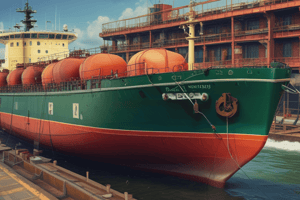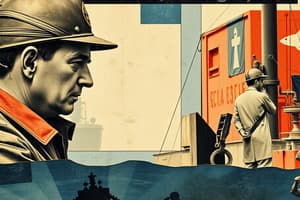Podcast
Questions and Answers
What is marine propulsion?
What is marine propulsion?
- The design and optimization of main propulsion plants
- The conversion of energy into rotational motion for propellers
- The utilization of electric motors for mechanical power
- The application of power to generate motion for seagoing vessels (correct)
Which systems are involved in mechanical propulsion?
Which systems are involved in mechanical propulsion?
- Liquefied natural gas (LNG) and wind power
- Diesel engines and gas turbines (correct)
- Gearing and hydrodynamics
- Electric motors and electrical energy
What is the main responsibility of marine engineers?
What is the main responsibility of marine engineers?
- Designing and optimizing main propulsion plants (correct)
- Utilizing electric motors for efficiency
- Developing alternative energy sources
- Ensuring safety and environmental standards
Which propulsion system is gaining traction as an alternative energy source?
Which propulsion system is gaining traction as an alternative energy source?
What do electrical propulsion systems utilize to convert electrical energy into mechanical power?
What do electrical propulsion systems utilize to convert electrical energy into mechanical power?
What factors are intertwined in the design of marine propellers?
What factors are intertwined in the design of marine propellers?
What is the purpose of waste heat recovery (WHR) systems in marine propulsion?
What is the purpose of waste heat recovery (WHR) systems in marine propulsion?
Which of the following factors are driving innovation in marine propulsion?
Which of the following factors are driving innovation in marine propulsion?
What is the goal of alternative propulsion technologies?
What is the goal of alternative propulsion technologies?
What is one of the challenges faced by the maritime industry in terms of propulsion?
What is one of the challenges faced by the maritime industry in terms of propulsion?
Which of the following is NOT a focus of research and development in marine propulsion?
Which of the following is NOT a focus of research and development in marine propulsion?
Why is it important for maritime engineers and professionals to stay informed about the latest trends, technologies, and regulations in marine propulsion?
Why is it important for maritime engineers and professionals to stay informed about the latest trends, technologies, and regulations in marine propulsion?
Flashcards are hidden until you start studying
Study Notes
Maritime Engineering: Exploring Marine Propulsion
Marine propulsion, a cornerstone of maritime engineering, is the application of power to generate motion for seagoing vessels. This vast field encompasses a deep understanding of mechanical, electrical, and hydrodynamic principles that are critical to seamless and efficient navigation.
Designing the Main Propulsion Plant
The main propulsion plant, including engines, propellers, and associated systems, is the heart of marine propulsion. Marine engineers are responsible for designing, developing, and optimizing these systems, ensuring they meet performance, safety, and environmental standards while minimizing operational costs.
Mechanical and Electrical Systems
Mechanical propulsion systems involve the conversion of energy into rotational motion, which is then transferred through gearing to the propeller(s). Diesel engines and gas turbines are common prime movers, while alternative energy sources like liquefied natural gas (LNG) and wind power are also gaining traction.
Electrical propulsion systems are becoming increasingly popular, especially for vessels that prioritize efficiency and environmental sustainability. These systems utilize electric motors to convert electrical energy into mechanical power.
Hydrodynamics and Efficiency
The design of marine propellers is a complex task, where efficiency, hydrodynamics, and performance are intertwined. Propeller design involves optimizing the vessel's speed, maneuverability, and fuel consumption. In recent years, the engineering community has seen a growing interest in waste heat recovery (WHR) systems, which utilize excess heat generated by engines to improve the efficiency of propulsion systems.
Fuel Efficiency and Emissions Reduction
The maritime industry is under pressure to decarbonize, and marine propulsion is at the forefront of these efforts. The Energy Efficiency Design Index (EEDI) and the Energy Efficiency Existing Ship Index (EEXI) are two key factors driving innovation in marine propulsion, with the aim of reducing fuel consumption and greenhouse gas emissions.
Alternative Propulsion Technologies
Waterjet propulsion, azimuth thrusters, and other innovative systems are being developed and implemented to meet the demands of the maritime industry. These technologies aim to improve maneuverability, reduce fuel consumption, and minimize environmental impact.
Research and development in marine propulsion are ongoing, and the field is constantly evolving. The adoption of alternative propulsion systems, the optimization of existing technologies, and the development of new materials and design methodologies will continue to shape the future of marine propulsion.
As marine propulsion continues to evolve, it is essential for maritime engineers and professionals to stay informed about the latest trends, technologies, and regulations to maintain the efficiency, safety, and sustainability of the maritime industry.
Studying That Suits You
Use AI to generate personalized quizzes and flashcards to suit your learning preferences.




